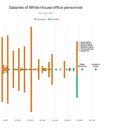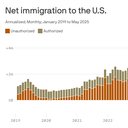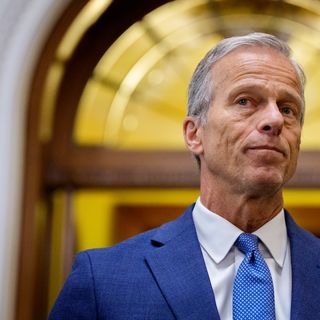Behind the Curtain: Zuck's AI moonshot
Mark Zuckerberg — in an unprecedented, multibillion-dollar talent raid — has dramatically reset the market for blue-chip AI builders, and further complicated the government's ability to stack its own technology bench.
Why it matters: The Meta CEO is trying to lure talent from OpenAI and other tech companies with offers that can top $100 million in total compensation for the first year alone — beyond most star athletes' pay.
Top-tier pay packages being offered by Meta for AI researchers can reach up to $300 million over four years, WIRED reports.
- A tech-news feed on X used a baseball card motif to portray an OpenAI researcher being "TRADED" to Meta.
The talent derby has sent compensation soaring across AI, as rivals scramble to keep top talent and entice others not to flirt with Meta and other suitors.
- It's partly a continuation of an ongoing recruiting war — OpenAI built its lab with the help of some massive comp packages.
- Zuckerberg unveiled his dream team this week as Meta Superintelligence Labs (MSL), after meeting personally with potential recruits at his homes in Palo Alto and Lake Tahoe.
The big picture: America has witnessed staggering valuations for startups. But never before have we seen company-valuation-sized salaries for people, rather than ideas or enterprises.
- That's injecting a new layer of drama and next-level economics for the biggest companies — many the size of nation-states — racing to win the AI wars.
Collateral damage: The U.S. government is already struggling to recruit top researchers and scientists. A remotely talented AI specialist can now assume that riches in the tens of millions are attainable. So why sacrifice to serve in government?
- China, by contrast, can command top talent to work on government projects. A front-page Wall Street Journal story on Wednesday, "China Is Quickly Eroding America's Lead in the Global AI Race," said AI models from Chinese companies, including DeepSeek and Alibaba, are becoming popular in Asia, Europe, the Middle East and Africa.
Zoom in: Zuckerberg's biggest single bet was investing $14 billion in Scale AI, and bringing co-founder Alex Wang to Meta as chief AI officer. Former GitHub CEO Nat Friedman will lead Meta's work on AI products and applied research.
- Eleven other new AI star hires were listed in Zuckerberg's internal memo announcing Meta Superintelligence Labs.
Altman hit back at Zuckerberg's spree this week, telling OpenAI researchers in a Slack message that Meta "has gotten a few great people for sure, but on the whole, it is hard to overstate how much they didn't get their top people and had to go quite far down their list," WIRED reports.
- "I am proud of how mission-oriented our industry is as a whole; of course there will always be some mercenaries," Altman added. "Missionaries will beat mercenaries."
Between the lines: Tech investors tell us that until very recently, the revenue outlook for AI models was unclear, and there was a debate about the return on capital spending. Now it's apparent that leading AI companies will do hundreds of billions in revenue per year.
- OpenAI is enjoying rampaging growth: The company said last month that it has $10 billion in annual recurring revenue, just 2½ years after the launch of ChatGPT — up from $5.5 billion last year. OpenAI has projected for investors that, fueled by AI agents and other new products, sales could total as much as $125 billion in 2029 and $174 billion in 2030, according to documents seen by The Information.
- Anthropic — a rival AI company led by Dario Amodei, an OpenAI alumnus — has hit a pace of $4 billion in revenue annually, up almost four times from January, The Information reported this week.
- At those rates of growth, you can see what Zuckerberg is seeing — and why he's suddenly pouring massive spending into making sure Meta remains a dominant AI player.
The backstory: Zuckerberg is repeating a winning playbook. By 2012, he realized Facebook was behind on the mobile web. He famously redirected the entire company toward catching up.
- Facebook bought Instagram for $1 billion and later WhatsApp for $16 billion — racing ahead in areas where others had innovated. But this time he's betting on individuals, rather than successful enterprises.
Reality check: Meta has spent a fortune on Llama, its large-language model (LLM), in an effort to develop a frontier model that can compete with OpenAI's ChatGPT, Anthropic's Claude and Google's Gemini. In a splashy story about "The List" of AI geniuses Zuckerberg is courting, the Wall Street Journal said Meta's "laggard history in generative AI has made some recruits hesitant."
- Bubbles can burst. AI salaries and data-center costs won't be sustainable without the ultimate payoff being unimaginably huge. And the more these companies spend, the bigger that payoff needs to be. As uncovered by a survey Axios reported last month, many small businesses using AI aren't even paying for it.
The other side: Altman, noting that OpenAI has built "a culture that is good at repeatable innovation," said last month on a podcast hosted by Jack Altman, his younger brother, that Meta was making "giant offers to a lot of people on our team — like $100 million signing bonuses" and more than that in annual compensation.
- "We're set up such that if we succeed ... then everybody will do great financially," Sam Altman said. "[I]t's incentive-aligned with mission-first, and then economic rewards and everything else flowing from that."
The bottom line: The bidding war is the most public manifestation of the secret race among AI giants — all betting that the technology will bring trillions of dollars in productivity gains. For them, the timeline is the biggest question.
- Axios' Scott Rosenberg, Ben Berkowitz and Zachary Basu contributed reporting.
Go deeper ... "Behind the Curtain: An AI Marshall Plan."





















